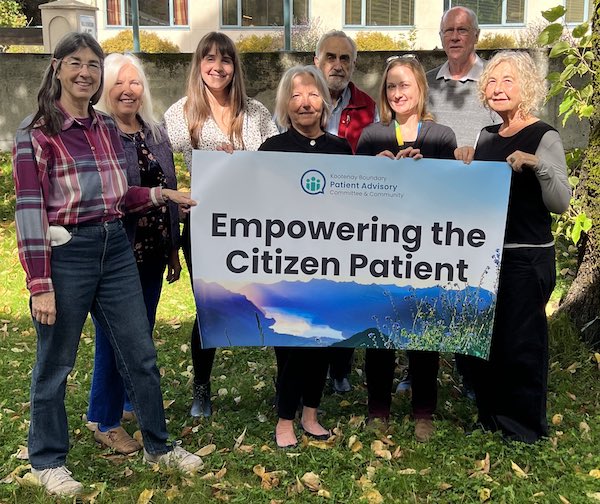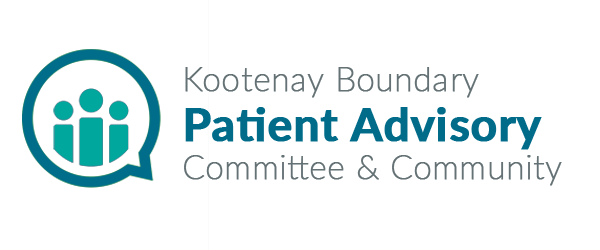Empowering the Citizen Patient

A New Campaign to Help People Support Their Health and Navigate Care in Kootenay Boundary
We all benefit from access to the information we need for our health & health care. The ‘Empowering The Citizen Patient’ series shares practical information to help community members better understand our health care system, alongside tips & resources to support health & navigate care in Kootenay Boundary.
In challenging times, with a family practitioner shortage and many barriers to patient care, this project aims to uplift community spirit, offer practical tips, and help everyone in our region participate more effectively in their health care at all levels.

Mindy Smith (PACC), RaNae Nicholls(PACC), Maggie Williams (PACC Admin, KBDivs), Maria Klement (PACC CoChair), Vince Salvo (PACC), Ksenia Forde (PACC Support, IH), Paul Burgener (PACC), Leora Gesser (PACC CoChair)
‘Empowering the Citizen Patient’ is led by the Kootenay Boundary Patient Advisory Committee & Community (PACC), which is a group of citizen patients. We want to reassure community members that the voice of patients is being heard, and that together with all the health care organizations, practitioners and managers and front-line health care staff, we’re working hard to continually improve the system so high-quality health care is available for all people in Kootenay Boundary.
“Knowledge is the cornerstone of empowerment,” says PACC CoChair, and Grand Forks resident, Leora Gesser. “As a community member and patient, I want to reassure community members that the voice of patients is being heard. I want to tell people about all the amazing, collaborative efforts going on to make our health system work better for us, and that we can get involved ourselves to help improve our health and health care in Kootenay Boundary. That’s what being a citizen patient is all about.”
We invite you to click/tap on the links below to learn more.
And we would love to hear from you!
What did you think of the articles you’ve read? What could we do better? Any suggestions for other articles that would be helpful? Please complete our short survey here!
Article #8: Be Prepared with Basic First Aid for Home and Play
Accidents and injuries are an inevitable part of life, often occurring when we least expect them. Whether it’s a slip of a knife in the kitchen, a fall from a bicycle, or a bee sting, being prepared to manage such incidents and knowing when to seek professional help are crucial…
Article #7: The Benefits of Early Screening for Your Health & Launch of KBScreen.ca Service
For many of us, staying healthy, especially as we age, is a top priority. One of the most effective ways to maintain health is through what practitioners call ‘preventive care’, including screening tests that can identify health problems before you have symptoms…
Article #6: Being Proactive to Maintain Your Health
On magazine racks, podcasts, instagram, Facebook and even on the nightly news, everywhere we look, someone is telling us how to stay healthy and live longer and better lives. The reality is that staying healthy is easier for the young, but harder to achieve as we get older. Yet, when we look at all the information, there are three pieces of advice that ring true. The best way to stay healthy is to …
Article #5: Taking a Closer Look at Supporting Our Psychological Well-Being
Mental health is a hot topic these days — from television, radio, to social media and kitchen table conversations. This surge in awareness is partly due to the opioid epidemic, the many crises our world faces, and of course, the COVID-19 pandemic. Mental health encompasses our emotions, feelings of connection to others, past trauma, our thoughts about ourselves and our ability to manage life’s ups and downs…
Article #4: Getting the Most Out of Medical Appointments
When you have an appointment with your family practitioner, it’s natural to have concerns and questions. An effective approach that many of my patients have found useful is to bring a maximum of one to three topics for discussion in order of priority. They create a clear, legible list with questions to ask in order to avoid forgetting important points. Bringing a piece of paper or a notebook for note-taking is also a good idea. Additionally…
Article #3: Tips for Caregiving and Caregiver Resources
At some point in our lives, we all take on the role of being a caregiver – whether it’s for a child, a partner with a temporary illness, a friend with cancer, or for an aging parent. Statistics Canada reports that, in 2022, 52% of women and 42% of men provided some form of care such as meal preparation, personal care, or helping with medical treatments for children and/or care-dependent adults. Caring for someone we love is a profound way to connect…
Article #2: Dr. Smith’s Tips for Taking the Reins on Medications
Managing medications can be a daunting task, especially when caring for loved ones. In this “Empoweringthe Citizen Patient” article, Dr. Mindy Smith shares valuable tips for medication management that she uses herself today, and recommended to her patients before retiring from practice.
Article #1: Healthy People, Healthy Communities – What’s Happening in Health Care
Access to health care is difficult for some and confusing for others; many people don’t have ongoing access to a family doctor or nurse practitioner (referred to as “Attachment”). Health care leaders – those people entrusted with overseeing and improving health care – are working hard to find solutions so that high-quality culturally safe health care is available for all. This article describes the current health care system in the Kootenay Boundary (KB) and provides a number of resources to help you better navigate the system.

Get the articles direct to your inbox!
